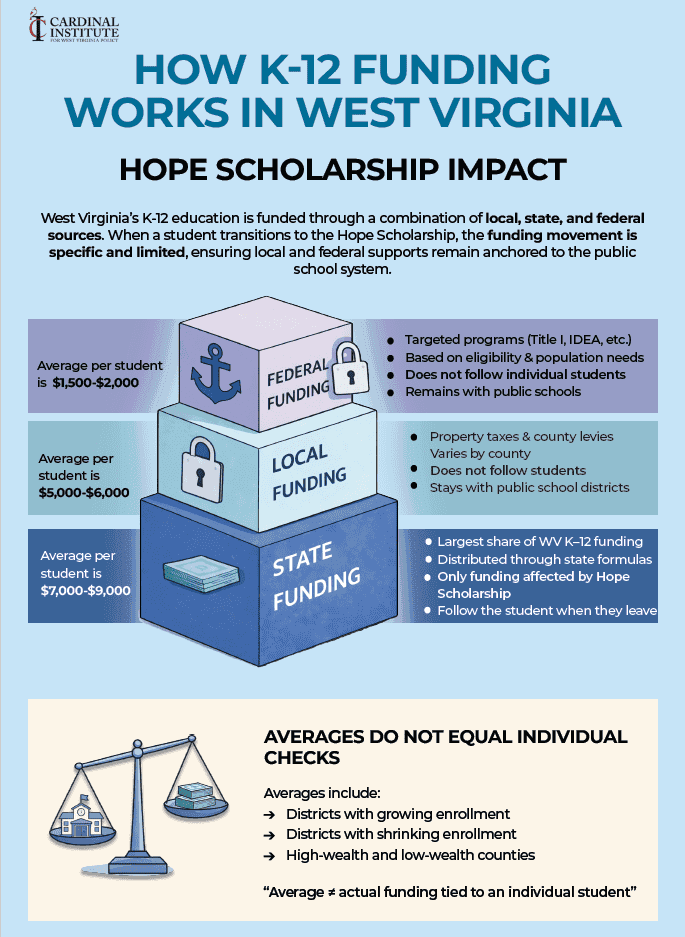
Best & Worst College Degrees in West Virginia
Which College Degrees Are Best and Worst in West Virginia?
This week the Cardinal Institute published the second—perhaps annual—report on the financial outcomes of college degrees in West Virginia. Last year’s report, using the U.S. Department of Education’s standards, identified 21 failing and 64 probationary programs at public colleges and universities.
But the Education Department assesses outcomes only two years after graduation. West Virginia alumni have much better outcomes after three years, as this year’s report shows, and the same is likely true nationwide.
Statewide Performance of College Degrees in West Virginia
- The vast majority of students graduate from public universities in West Virginia with less than $30,000 in debt, although most programs produce graduates who earn less than $60,000 annually after three years.
- The vast majority of degree programs in West Virginia have a debt-as-percent-of income ratio (DPE) between 40% and 80%.
- Bachelor’s degree holders studied in 2021 had a DPE of 78%, two years after graduation: about $32,000 in income and $25,000 in debt. But the cohorts studied in 2022, three years after graduation, had $41,000 in income and $28,000 in debt. Debt had gone up, but incomes had gone up much more. DPE decreased from 78% to 68%.
- The same is true for master’s degree holders: DPE decreased from 78% to 73%.
This means that the U.S. Department of Education is making a mistake by judging the financial value of bachelor’s and master’s degrees too soon. Many college programs that would fail a two-year test would not fail a three-year test, and even fewer would fail a later test. Indeed, degree insurance in the private market, which compensates a graduate for having below-median income for the student’s field, uses a five-year test.
More good news is that associate degrees continue to perform extremely well in these terms. They are often so inexpensive that there is not enough data on student debt to report. Most of the top ten DPE scores are for programs in the Community and Technical College system.
Biggest Losers
Accordingly, excluding medicine-related and law programs, which have unusual outcome trajectories, only six programs deserve the most heightened attention.
- Marshall: bachelor’s degrees in psychology and in teaching; master’s in counseling
- WVU: bachelor’s degrees in drama and in fine arts
- WVSU: bachelor’s in psychology
That psychology degree is the worst performer: income after three years is $20,000 and college debt is $30,000, producing a DPE of 152%. But WVU’s drama degree is only slightly better; alumni are only earning $20,000, but their debt is slightly less at $29,000 (DPE of 140%).
Biggest Winners
Nursing degrees do extremely well across the board, ranking numbers 3, 4, 5, and 10 among the top programs by DPE. Fields in “allied health” rank 6, 7, 8, and 12.
Pierpont has the top two spots. Once again, Electrical and power transmission installers with associate degrees top the list. After two years (last year’s report), they were earning $87,000, and after three years (this year’s report) they are earning $114,000. They have a very manageable $12,000 in college debt. Number 2 are Pierpont alumni with associate degrees in mining and petroleum technologies, with similar debt and with income rising from $57,000 in year two to $68,000 in year three.
WVU has the top performers among both bachelor’s degree and master’s degree programs. Its top bachelor’s is in chemical engineering: $80,000 income, $25,000 debt, DPE of 31%. Its top master’s is in accounting: $67,000 income, $19,000 debt, DPE of 28%.
Among programs with alumni who have no debt at three years, there is no DPE calculation. Top performers by income, with available data, are:
- First professional degree in Osteopathy at West Virginia School of Osteopathic Medicine: $75,000.
- Master’s degree in Criminal Justice at Marshall University: $52,000.
How Does Your College Program Rank?
Table 4 in the report identifies the 50 programs with the best DPE scores. Separately we are posting the debt and income statistics for all programs for which there is data. Great thanks are due to Andrew Gillen of the Texas Public Policy Foundation, who inspired this project, compiled the data, and calculated the DPEs.
Accountability
Starting next year, the data might be harder to interpret because of the financial impact of responses to the pandemic. For now, it is worth considering the many options that exist for accountability to stakeholders, including the taxpayers who subsidize public colleges and universities.
At the government level, accountability could include eliminating state authorization for low-performing programs, reducing or eliminating state funding for the programs, and increasing regulation or reporting requirements.
At the institution level, accountability could include investigating why a program appears to be underperforming, followed by new reporting requirements or administrative restrictions, funding restrictions, tuition changes, reducing or freezing enrollment, reforming or eliminating the program, and improving employment counseling and related resources.
It is important to remember that DPE is a one-size-fits-all metric. It should be used in conjunction with other measures of value and quality, such as graduation rate, life satisfaction, loan default rate, and specialized outcomes (such as nationally normed test scores and admission rates to graduate and professional programs).
Overall, this report empowers stakeholders with knowledge of which programs are most worth pursuing from a financial perspective. Conversely, this report shows which college degrees in West Virginia should be either improved or canceled. Wise colleges will seek opportunities to expand successful programs and to phase out or reform those that are failing.
Adam Kissel is a Senior Fellow for the Cardinal Institute for West Virginia Policy.
Updated 12/20/22 to reflect changes in Department of Education Policy.







